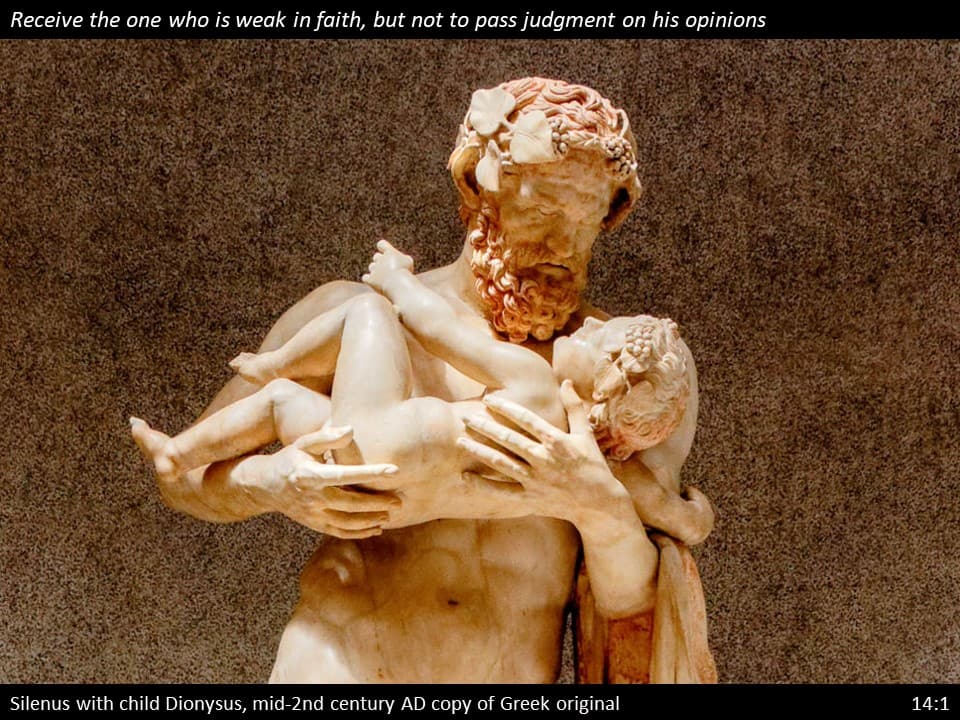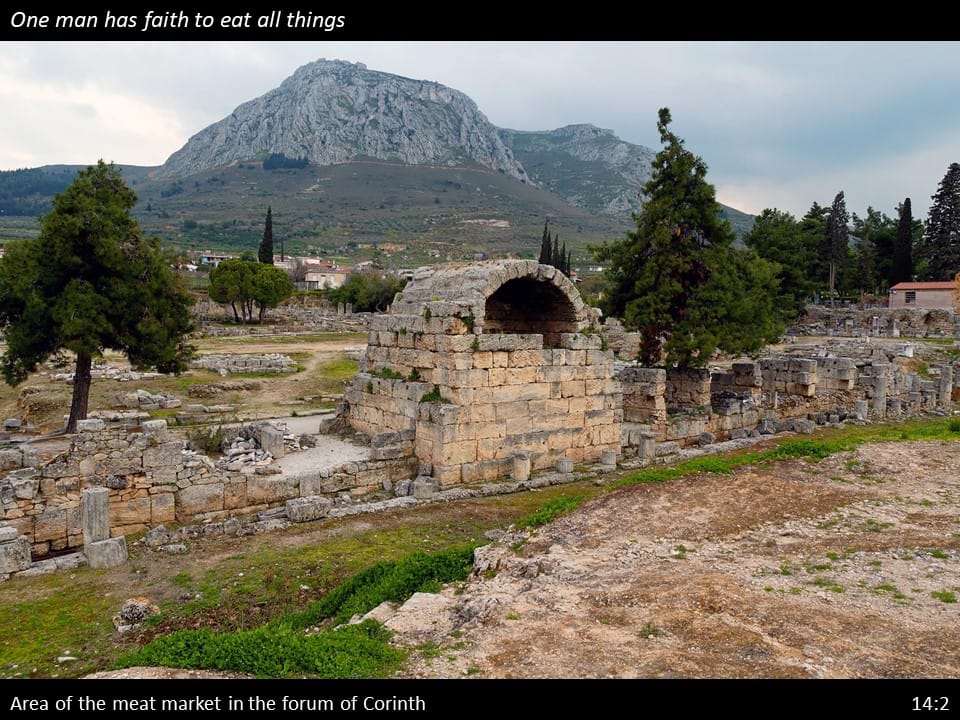What I Noticed Today (Romans 14-16)
Romans 14






In Romans 14, Paul’s focus narrows to a more specific discussion of the interpersonal relationships between believers.
In verses 1-12, Paul admonishes believers to accept others who are weak in the faith and not to argue about doubtful issues. One who eats everything should not look down on one who eats only vegetables. God has accepted us all.
Note: The exact problem Paul addresses here is unknown but it is quite possible that with Christian brothers coming from different backgrounds, there were different beliefs about what food was acceptable and that which was not. Some believed eating meat offered to idols was unacceptable, others believed it was not an issue.
A second example Paul raises is whether one day of the week is more important than another. Some consider one-day holy others consider all days equal. Whatever we believe, do it for the honor of the Lord.
We should not pass judgment on our brothers in these kinds of matters. One person’s belief is not above another’s. We will all give an account of our beliefs to the Lord.
In verses 13-23, Paul now focuses on how our own behavior may affect other believers. We should help one another grow spiritually. We should not be a stumbling block to other believers. Jesus said nothing is unclean in itself, but some may still believe it to be unclean. Eating what a brother views as unclean may grieve them and this is not acting in love to our brothers.
The kingdom of God is not built on what we eat or drink but on righteousness, peace, and joy in the Holy Spirit.
Therefore, Paul concludes, we should do things that promote peace and build each other up. If you have a strong conviction about eating or drinking, keep it to yourself and do not condemn your neighbor for their belief.
Note: Jewish Christians, in particular, may have had long-held beliefs about what kinds of food were clean and acceptable to God and those that were not. Paul’s point is we should not create disputes with our brothers over such things. If they believe out of faith, they honor God.
Romans 15
























In Romans 14, Paul discussed interpersonal relationships between believers, and specifically, we should not condemn or look down on weaker brothers and to be aware of how our behavior affects others, believers. In Romans 15, Paul’s focus turns to our need to be Christ-like in our dealings with our Christian brothers and sisters.
In verses 1-6, Paul summarizes the teaching of Romans 14. The strong should help the weak in the faith and edify them (build them up).
The scripture was given as instruction so that we might have endurance and encouragement in the present and hope for the future. Paul’s prayer is this endurance and encouragement will allow them to live in harmony with one another so that they might glorify Christ with a united mind and voice.
Note: Paul is emphasizing the importance of the instruction found in the Scripture (“written in the past” is a reference to the Old Testament) in believer’s lives.
In verses 7-13, Paul exhorts believers to accept one another just as Christ accepted us. The purpose of unity among Christian believers is to bring glory to God.
Note: Jewish and Gentile believers had difficulties accepting one another because of differences in culture and beliefs. Paul is admonishing them to accept one another because Christ accepted all of them regardless of their culture and background.
Messiah became a servant of the Jews (the circumcised) to confirm the covenants of God. Paul quotes 2 Samuel 22:50 and Psalm 18:49 (God will be praised among the Gentiles). He also quotes Deuteronomy 32:42 and Psalm 117:1 directing the Gentiles to rejoice and praise the Lord. Paul closes this section quoting Isaiah 11:10; the Gentiles will be ruled by the Lord.
Note: There is a progression in these four Old Testament scriptures Paul quoted:
David praised God among the Gentiles.
Moses exhorted the Gentiles to rejoice in the Lord.
The Psalmist commanded Gentiles to praise the Lord.
The Gentiles will be ruled by the Lord and place their hope in Him.
Paul concludes this section with a prayer asking for a blessing on all believers that they might be filled with joy and peace so that they might overflow with hope and the power of the Holy Spirit.
Romans 15:14-16:27
This section contains Paul’s closing remarks. It is the longest closing of all the letters he wrote.
In verses 14-21, Paul compliments the Roman believers saying he is convinced they are full of goodness and complete in knowledge and perfectly able to instruct one another.
Nevertheless, Paul wrote boldly on some points because he saw it as his priestly duty and part of his responsibility to proclaim the Gospel. Paul’s purpose is the Gentiles will be an acceptable sacrifice (to God), sanctified by the Holy Spirit.
Therefore, Paul says, He glories in his service to the Lord and what Christ accomplished through him in leading Gentiles to the Lord through the power of the Holy Spirit.
Because of God’s enabling, Paul had been able to preach the Gospel from Jerusalem around to Illyricum (modern Albania). His goal was not to build on other’s foundation but to take the Gospel where it had never been heard before (quoting Isaiah 52:15).
Note: Paul viewed himself as a church planter, an evangelist called by God to take the Gospel where the message had never been heard. He did not see himself as called to build a church someone else had started.
In verses 22-33, Paul details his future travel plans.
Since he saw no more work to do in these provinces, he planned to visit Rome on his way to Spain.
Note: Spain was a Roman colony on the western edge of the Roman empire. A large Jewish population lived there. His hope was to visit the brothers in Rome and have them assist in his journey to Spain.
Paul’s immediate plan was to go to Jerusalem to deliver a gift from the brothers in Macedonia and Achaia. After delivering the gift to the poor brothers in Jerusalem, he planned to journey to Rome and then on to Spain.
He concluded asking the brothers in Rome to pray in three specific areas:
- That he would be rescued from unbelievers in Judea (v. 31).
- That the gift he was bringing would be acceptable to the saints in Jerusalem (v. 31).
- That if it is God’s will, he would visit the saints in Rome and be refreshed by them (v. 33).
Note: Ultimately, all three of these prayers were answered, although perhaps not in the way Paul might have expected!
Romans 16










Paul closed his letter to the Romans by extending personal greetings to friends in Rome, a warning about division, and gave glory to God for all He had done.
In verses 1-2, Paul commends Phoebe, a servant of the church in Cenchreae, asking the Romans brothers to welcome her and care for her.
Note: Cenchreae is a seaport village just east of Corinth.
In verses 3-16, Paul extends greetings to 26 people by name and a number of others (members of a named household).
Note: The importance of women in Paul’s ministry circle is evidenced by the fact that nine women are named.
He exhorted them to greet one another with a holy kiss and said the churches of Christ send greetings.
In verses 17-18, Paul issued one final warning to be mindful of brothers who would cause dissension and teach doctrine contrary to what they had learned. These people do not serve the Lord but only themselves.
In verses 19-20, Paul commends the obedience of the Roman believers and says he rejoices over them. At the same time, he wants them to be wise about what is good and wary of what is evil. God, says Paul, will crush Satan under your feet.
Note: Paul was especially wary of those who brought false teaching into the church. They used smooth talk and flattering words to lead believers astray.
In verses 21-24, Paul closed the book with a final greeting from Timothy, Lucius, Jason, Sosipater, Gaius, Eraster, and Quarter, along with the church (in Corinth), greet you.
Note: Verse 24 is a benediction that repeats verse 20b. It is not found in major Greek manuscripts and is not considered genuine.
In verses 25-27, Paul offers his closing benediction. He wished the Gospel he preached about Christ, revealed in the Scriptures, would be preached among all nations according to God’s command to advance the obedience of faith. To the only wise God, through Jesus Christ, be the glory forever.
Some thoughts for additional consideration:
- Paul exhorted believers to be accepting of one another despite differences in backgrounds and cultural beliefs as long as those differences did not compromise the Gospel message. We should be careful when we judge or reject other believers because Jesus accepted us, and He is the final judge.
- It is important to remember that Paul’s ministry was aided by a large following of faithful believers. Never think that we can or should be alone in our service to God! God created us unique with unique gifts so we can help each other. Nowhere is this more apparent in Paul’s life than in his final greetings to the believers in Rome.
What did you notice in your study today? Feel free to visit the website and leave a question or a comment.

